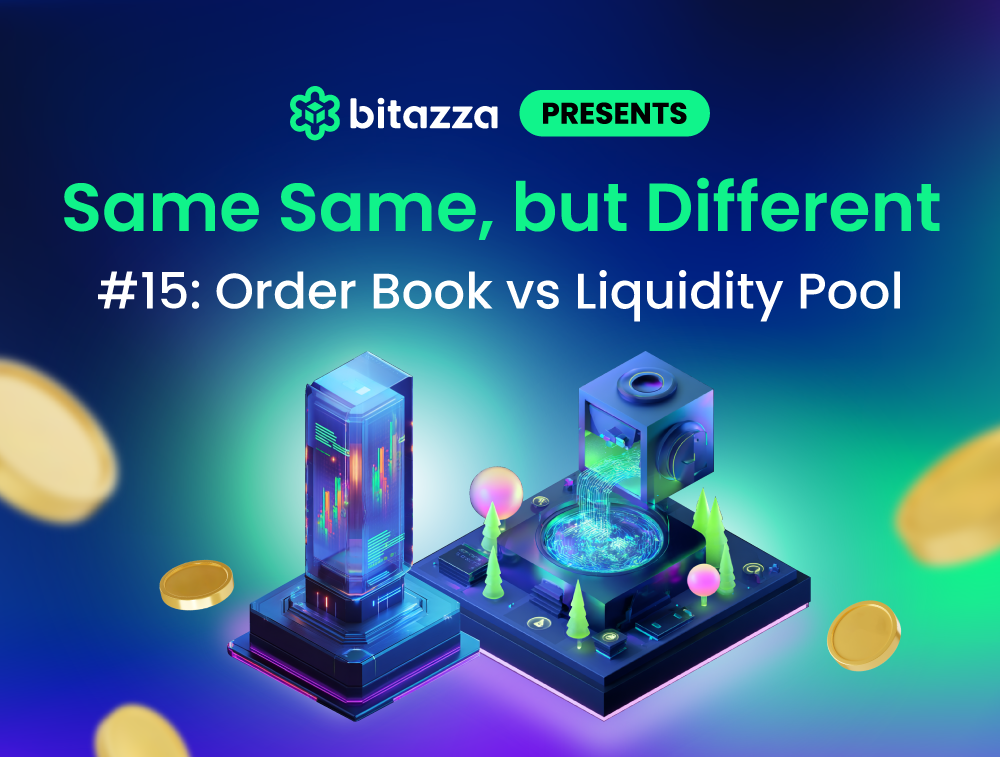Share this
Same Same, but Different #15: Order Book vs Liquidity Pool

The core function of every trading platform is to match a buyer with a seller.
In the world of finance, there are two major mechanisms that achieve this. However, one is newer than the other. They are order books and liquidity pools. Both make crypto trading possible, but they do so using very different systems. Let’s break it down.
Same Same: Both Enable Crypto Trading
Both order books and liquidity pools are designed to:
- Facilitate digital asset swaps between two parties
- Provide pricing based on supply and demand
- Serve as the core engine behind most crypto exchanges
They’re the essential tools to ensure market liquidity, and without them, trading just simply wouldn’t work.
Different: Centralized Matching vs. Automated Swaps
The Order Book is like a matchmaker in the middle, often used by centralized exchanges (CEXs) like Bitazza, Binance, or Coinbase. It is a constantly updated list of buy and sell offers at various price levels. See that fast-moving sequence of numbers in red and green whenever you’re trying to buy or sell a token? That's the order book for that particular trading pair.
How it works:
- Traders manually submit buy or sell orders
- The system automatically matches orders when prices align
- Market orders execute instantly at the best available price
- Limit orders wait in the book until matched
Advantages:
- Full price control (via limit orders)
- Transparent market depth
- Ideal for high-volume, low-slippage trades
Example: if you place a limit order to buy 1 ETH at $3,000, the exchange waits until a seller offers ETH at that price. If it’s a market order, it fills instantly with the current market price at the best ask.
The Liquidity Pool however, is a smart contract on standby.
Liquidity pools power decentralized exchanges (DEXs) like Uniswap, PancakeSwap, and Raydium. They remove the need for matching buyers and sellers directly.
How it works:
- Liquidity providers (LPs) deposit equal values of two tokens into a smart contract
- Traders swap directly with the pool
- The price is adjusted automatically by a constant product formula (e.g., x × y = k)
- LPs earn a cut of trading fees
Advantages:
- No order book or manual matching
- Open 24/7 with no centralized authority
- Efficient for smaller token pairs and DeFi use cases
Example: on a DEX like Uniswap, if you swap one of your tokens for another, the DEX instantly recalculates the exchange rate based on the current pool balances.
However, do take note that since the rates are dynamic and there’s no human match needed, you should also pay close attention to the fee amounts when you’re trading on DEX, especially on tokens with low liquidity as there may be higher slippage costs.
Quick Comparison Table
|
Feature |
Order Book |
Liquidity Pool |
|
Used By |
Centralized Exchanges (CEXs) |
Decentralized Exchanges (DEXs) |
|
Matching Mechanism |
Buyer-seller matching via orders |
Smart contracts swap directly with pools |
|
Price Discovery |
Determined by bids and asks |
Algorithmic (via AMMs like x×y=k) |
|
Control Over Price |
High (limit orders) |
None (price is automatic) |
|
Slippage |
Low if liquidity is deep |
Higher with low liquidity |
|
Examples |
Bitazza, Binance, Coinbase |
Uniswap, PancakeSwap, Raydium |
|
Liquidity Provided By |
Traders placing orders |
Users depositing token pairs |
Which One Should You Use?
Use Order Book trading if you:
- Want full control over pricing and order size
- Trade large volumes that require precision
- Prefer centralized platforms with customer support
Use Liquidity Pools if you:
- Trade on-chain and value self-custody
- Prefer simplicity (no order books to manage)
- Plan to derive income by providing liquidity
Both systems are critical to how the crypto economy moves, even if they use very different engines. Same same, but definitely different.
Start Exploring
Whether you are here for crypto, NFTs, DeFi, or the broader Web3 space, Bitazza gives you one platform to explore it all with simplicity, security, and confidence.
Want to learn more about crypto and blockchain basics? Head to our blog.
Share this
- February 2026 (2)
- January 2026 (4)
- December 2025 (13)
- November 2025 (6)
- October 2025 (10)
- September 2025 (8)
- August 2025 (17)
- July 2025 (29)
- June 2025 (13)
- May 2025 (14)
- April 2025 (12)
- March 2025 (8)
- February 2025 (8)
- January 2025 (8)
- December 2024 (7)
- November 2024 (5)
- October 2024 (14)
- September 2024 (9)
- August 2024 (14)
- July 2024 (3)
- June 2024 (48)
No Comments Yet
Let us know what you think